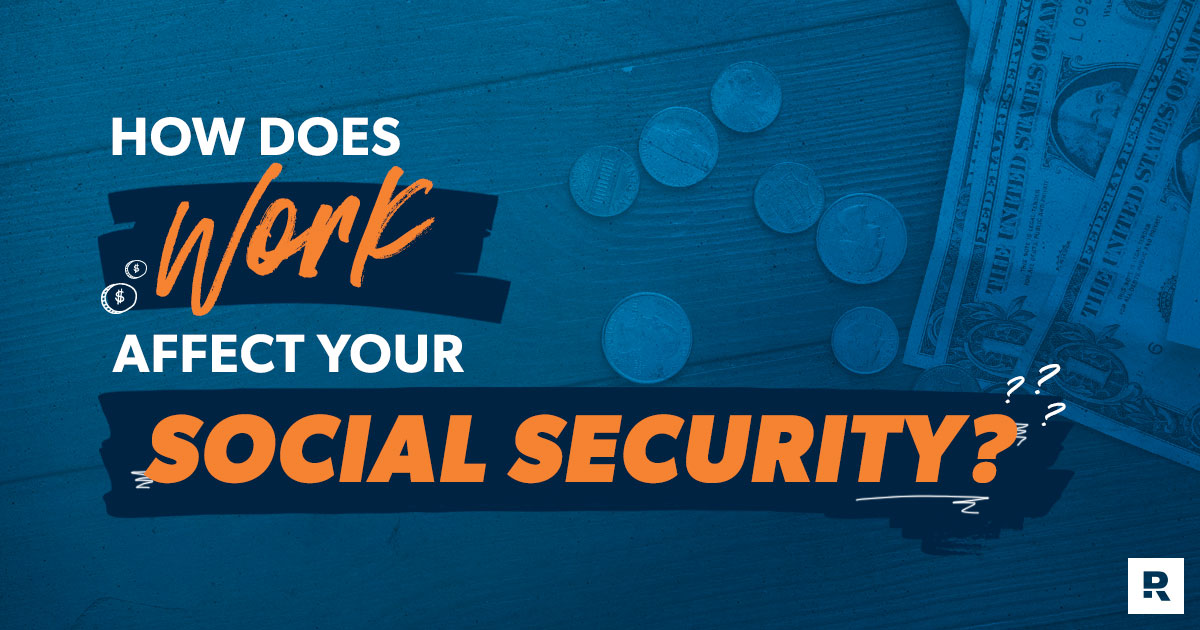How Does Work Affect Your Social Security?
7 Min Read | Apr 17, 2025

Key Takeaways
- Yes, you can work while collecting Social Security, but your benefits will be reduced by $1 per every $2 you earn over a certain household income each year.
- Those reduced benefits aren’t lost forever—they’re simply being withheld by the government until you reach full retirement age (67). At that time, you’ll receive a larger monthly benefit to make up for the earlier reduction.
- Once you reach full retirement age, you can receive your full retirement benefits without any reductions—even if you’re still working.
- The longer you wait to take Social Security, the larger your retirement benefits will be. If you wait until age 70, you’ll receive the maximum retirement benefit possible.
A quick refresh: Social Security is a program designed to replace some of your income when you retire or if you become disabled. It’s a huge social safety net program that supports millions of Americans in retirement.
Market chaos, inflation, your future—work with a pro to navigate this stuff.
And once you celebrate your 62nd birthday, you’re eligible to start receiving retirement benefits from Social Security. But if you’re still working and don’t plan to slow down any time soon, you might have some big questions to answer: Can you keep working and receive benefits at the same time? And if so, should you start collecting Social Security benefits early, or wait?
These questions can have a big impact on the amount you receive every month and your overall retirement plan. Don’t worry—we’re going to dig into all of it so you can decide what’s best for your situation.
When Can I Start Taking Social Security?
While full retirement age is 67 for everyone born in 1960 and later, you can start collecting Social Security as early as 62 or as late as 70. But remember, the earlier you collect, the less money you’ll receive every month. The longer you wait, the more you take.
If you’re eligible to collect Social Security now but you don’t have any plans to retire (for now), the big decision is whether to start collecting your benefits while you’re still on the company dime or to wait until you reach full retirement age for an increased monthly payment.
Every person’s situation will be a little different, but here are the scenarios you might find yourself in.
Can I Collect Social Security Early and Keep Working?
Short answer: Yes, you can claim Social Security as early as 62 and continue to work. But there are some things you should consider before collecting.
First, if you choose to take your Social Security benefits before full retirement age, it means permanently accepting reduced benefits.1 Here’s how the cookie crumbles:
Sample Social Security Benefit Scenario
If you’re scheduled to receive $1,000 at the full retirement age of 67*
|
Claiming retirement benefit at age: |
Your retirement benefit will be: |
How much you’ll receive: |
|
62 |
Reduced by 30% |
$700 |
|
63 |
Reduced by 25% |
$750 |
|
64 |
Reduced by 20% |
$800 |
|
65 |
Reduced by 13.3% |
$867 |
|
66 |
Reduced by 6.7% |
$933 |
|
67 (full retirement age) |
Reduced by 0% |
$1,000 |
|
70 |
$1,240 |
* You were born in 1960 or later.
Second, if you decide to start taking your retirement benefit before you reach full retirement age and keep working, that could reduce your monthly benefit even more. Let’s talk more about that.
How Will Work Affect the Amount of My Early Retirement Benefit?
Unfortunately, if you do decide to keep working while collecting early retirement benefits, that could lower the amount of your retirement benefit.
You see, there’s an income threshold for workers who collect Social Security benefits, and if your income is above that threshold, you’ll get a smaller monthly benefit.
In 2024, that threshold is $22,320.4 That means, if you start collecting Social Security early, continue to work, and make more than $22,320 a year, your retirement benefits will be reduced $1 for every $2 you earn over $22,320.
(Keep in mind that not all income counts toward your limit, only earnings from work. Income from other government or military retirement benefits, investment earnings, interest, pensions, annuities and capital gains, for example, aren’t counted against your limit.5)
So, let’s say you turned 62 this year, but you still want to work part time and start taking your Social Security retirement benefits once you’re eligible. If your income this year is $30,000, that means your annual retirement benefit will be reduced by $3,840 (or $320 each month).
But the good news is, those reduced benefits aren’t lost forever—they’re just being held back by the government for now. Those withheld benefits will be returned to you once you reach full retirement age. At that point, Social Security will re-run your numbers and increase your monthly benefit to make up for the earlier reduction.6
Invest Like No One Else
From investing advice to wealth management, find a SmartVestor Pro who speaks your language.
Ramsey Solutions is a paid, non-client promoter of participating pros.
What if I Wait Until My Full Retirement Age and Keep Working?
Another option you have is to wait until the full retirement age of 67, when you can start to collect your full retirement benefit and continue to work. And the good news is, by that point, you can keep all your benefits no matter how much you earn.7
There’s one area to look out for here, though. In the year you actually turn 67, there’s still an income threshold. It’s quite a bit higher at $59,520, but if you go over it, you’ll see a reduction in benefits.8 For every $3 you earn over the threshold, Social Security will take $1.
But once you are officially 67, you’re in the clear.
What if I Keep Working but Wait Until Age 70 to Collect My Retirement Benefit?
It’s simple: The longer you wait to take Social Security, the larger your retirement benefit will be. If you wait until age 70, you’ll receive the maximum retirement benefit possible—which is 24% larger than the full retirement benefit you’d get at age 67.9
So, if you continue to work up to age 70, not only are you getting the largest Social Security retirement benefit possible, but you’re also (hopefully) funneling income from work into savings and investments so that you can retire with a solid nest egg.
But here’s the thing: While waiting until you’re 70 to start receiving retirement benefits does mean a larger monthly benefit, it also means less time receiving a monthly payment. Depending on when you pass away, you could have ended up with more Social Security payments throughout your retirement if you had taken them earlier.
When Should I Start Taking My Social Security Benefit?
So, a good question to ask yourself when deciding how soon to start collecting is: Will I need Social Security for living expenses?
Taking Social Security early is usually a really good idea, especially if you have (or expect to have) health issues in retirement, or if you don’t rely on that money for everyday expenses and can invest it instead. This offers you and your loved ones much-needed financial support right away and gives you a better chance to maximize your benefits while you’re still alive.
Plus, if you can keep working during that time, you can use that extra cash to continue growing your nest egg so you can retire when you’re ready.
If you don’t need your benefits for day-to-day costs, you could claim your Social Security early and invest that money. You’ll make more money investing those funds in growth stock mutual funds than waiting and earning full Social Security benefits. Plus, when you die, that money will stay part of your estate.
If you do need Social Security benefits for everyday living expenses—and you’re in good health—we think your best bet is to wait and keep working. Remember, Social Security is like the dessert to your main course—it’s the added bonus, not your complete retirement plan. If you still have debt or are living without a fully funded emergency fund, taking your benefits early is not the way to go.
Next Steps
- If you want a better understanding of where you are today and how much you need to save each month for retirement—without having to rely on Social Security—take the R:IQ retirement assessment.
- Ready to start budgeting for today and your future? Check out EveryDollar, our free budgeting app. It will guide you through how to make a zero-based retirement budget so you can give every one of your hard-earned dollars an assignment.
- And don’t forget, if you need help planning for retirement, you can find an investment pro in your area through the SmartVestor program.
This article provides general guidelines about investing topics. Your situation may be unique. To discuss a plan for your situation, connect with a SmartVestor Pro. Ramsey Solutions is a paid, non-client promoter of participating Pros.



